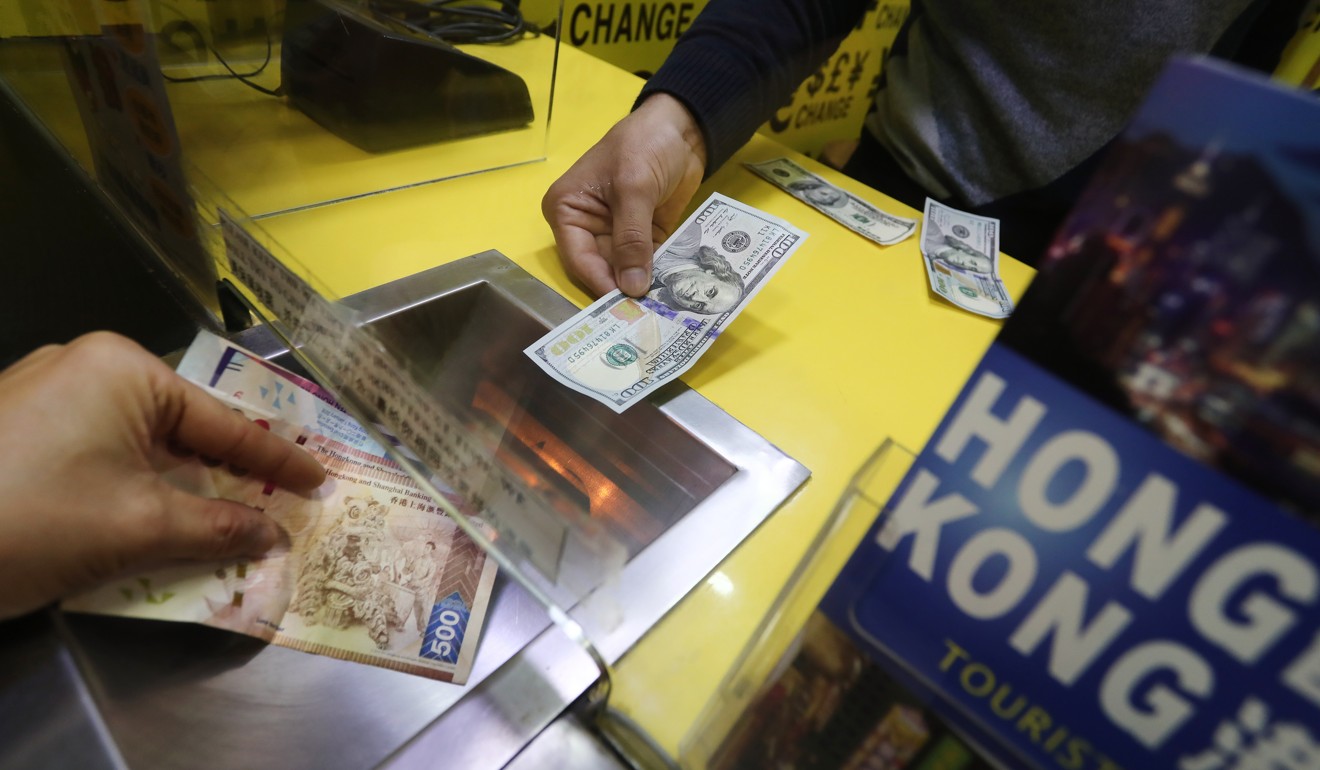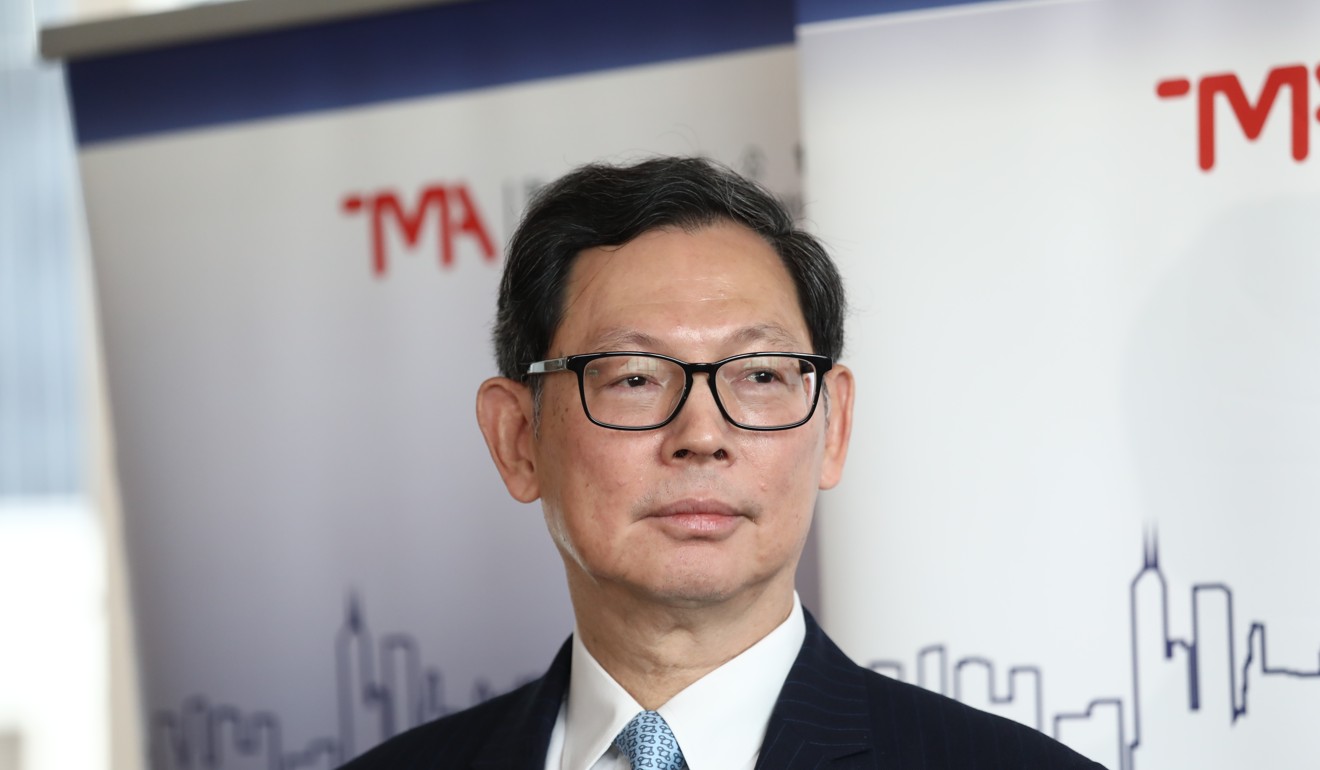
Short sellers believe a weakening economy will force Hong Kong Monetary Authority to tweak the currency peg
- Currency bear Thomas Roderick says that the government may eventually consider removing the peg or at least make some change to the system
- Ignatius Chan Tze-ching, a senior adviser to Bank of East Asia, says that the government will not change the peg, and has the ability to defend it

The months-long protests have hit Hong Kong’s economy hard, pushing it to the brink of a recession, leading some fund managers to bet that the Hong Kong dollar’s peg to the US dollar is on borrowed time, but the Hong Kong Monetary Authority and bankers say such a move is unlikely.
Thomas Roderick, portfolio manager at UK boutique fund house Trium Capital, which manages US$700 million, is among those who have been shorting the Hong Kong dollar in recent months.
He believes the protests and possible recession might lead the government to change or remove the peg, which has been fixed at HK$7.8 per US dollar since October 1983. The Hong Kong Monetary Authority, the city’s de facto central bank, intervenes as needed to make sure the currency trades within the band of 7.75 to 7.85. The currency stood at 7.84 against the US dollar on Friday.
Roderick said that the peg is designed in such a way so that the Hong Kong dollar’s exchange rate can be defended and that it remains stable even when overseas markets are in the midst of serious crisis like the Asian financial crisis in 1997 and the global financial crisis in 2009.

“However, it is not designed to handle a domestic crisis, which has never happened before,” Roderick said during a recent visit to Hong Kong.
Hong Kong has seen escalating violence against the now-withdrawn extradition bill. The protests, now in their 17th consecutive weekend, have morphed into a wider movement for greater democratic freedom, with protesters calling on the government to address issues such as unaffordable housing and income inequality.
The protests have done serious damage to retail, tourism and restaurant sectors. Financial Secretary Paul Chan Mo-po recently said that he expected the city to enter into a technical recession in the third quarter.
Roderick said that he has no intention in seeing the Hong Kong dollar break its peg to the US dollar. “I love Hong Kong ... My trading position just reflects my belief that the interest rate would go up at least 50 basis points over the next few months. This does not make sense for Hong Kong interest rates to go up when the city is going into recession. This is why I believe the government may eventually consider removing the peg or at least make some change to the system.
“When there is a recession, the government cuts interest rates to help companies and individual borrowers to cope with a poor economy. However, under the currency board system, the HKMA will need to drive the interest rate up to defend the peg whenever it trades at the weak end,” Roderick said.
The one-month Hong Kong interbank offered rate, a gauge of Hong Kong’s bank funding costs, stood at 1.89 per cent on Friday, similar to a year ago but higher than about 1.7 per cent at the beginning of this year.
The HKMA has spent HK$125.6 billion (US$16 billion) since April 2018 to buy the Hong Kong dollar to prevent it from falling below the weak end of the peg. As a result, the aggregate balance – a measure of liquidity in the local banking sector – fell from HK$176 billion in April last year to HK$54 billion on April 2 when the HKMA last intervened to support the currency.
It was in April when Roderick first started to short the Hong Kong dollar. “When the aggregate balance dropped to about HK$54 billion, banking liquidity had dried up to a level that would have made it easier for the interest rate go up,” he said.

Kyle Bass, chief investment officer of Hayman Capital Management, is another short seller who urged investors to shift their Hong Kong dollar assets into US dollars in a tweet in May.
“No change to our thesis. We cannot comment on positioning or performance,” Bass told the Post in an email last week. “We expect the Hong Kong Police and Chinese PAP ‘People’s Armed Police’ to increase brutality levels over the next two weeks and are worried for the protesters.”
So far China has not sent any troops from the mainland to quell the protests and there have been no indications from Beijing that it will.
HKMA chief executive Norman Chan Tak-lam last week said short sellers would fail as the market has become much bigger nowadays. “The short sellers who want to attack the local currency will find they will need many more bullets to carry out their attacks,” Chan said.

A HKMA spokesman said that recent statistics indicate that there has not been any noticeable outflow of funds from Hong Kong, and even if it happens, HKMA’s sound and prudent banking system can cope.
He added that the HK$1.1 trillion of Exchange Fund Bills and Notes could turn into banking liquidity at any given moment.
Ignatius Chan Tze-ching, a senior adviser to Bank of East Asia, said that the government will not change the peg, and has the ability to defend it.
“When we are facing a recession, [the government] would need to maintain the peg to add confidence to the financial market,” he said.